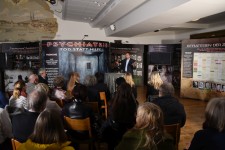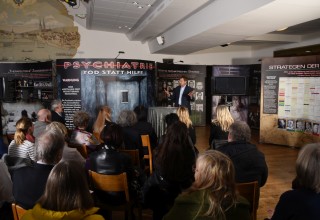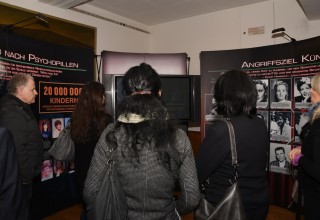Exhibit Jolts Parents With Facts About the Drugs They Are Giving Their Kids

ZURICH, Switzerland, March 15, 2018 (Newswire.com) - In June 2017, United Nations Special Rapporteur on the right to health, Dainius Pūras, called for a sea change in mental health care around the world. “There is now unequivocal evidence of the failures of a system that relies too heavily on the biomedical model of mental health services, including the front-line and excessive use of psychotropic medicines, and yet these models persist,” he said.
Nowhere is this more apparent than in the escalating prescription of highly addictive and dangerous drugs to young people in Switzerland, according to a Swiss MP who spoke at the March 2018 opening of the Citizens Commission on Human Rights Psychiatry: An Industry of Death traveling exhibit. “These drugs have a similar effect to cocaine and therefore fall under the narcotics law,” he said.
I was in a psychiatric clinic for more than a year. The drugs did not help my severe depression and I witnessed four suicides while I was there.
Former patient at a psychiatric clinic
Methylphenidate, the generic name of the drug in question, causes rapid or irregular heartbeat, delirium, panic, psychosis, and heart failure. The drug is a controlled substance with cocaine-like properties.
Swissmedic, the agency responsible for controlling drugs and medical devices in the country, has published warnings on the addictive nature of this drug and the increased risk of suicide from its consumption.
Additionally, children are prescribed dangerous antipsychotics at an alarming rate for behavior problems psychiatry classifies as “ADHD,” without any drug agency approval to do so.
The Psychiatry: An Industry of Death exhibit puts child drugging and other psychiatric paradigms into a historical perspective, showing a long history of the industry’s use of ineffective and dangerous experimental methods.
Among those visiting the exhibit were several psychiatric victims who spoke of the harm they experienced from psychiatric drugs.
“I was in a psychiatric clinic for more than a year,” said one guest. “The drugs did not help my severe depression and I witnessed four suicides while I was there.”
One psychologist who toured the exhibit confided to a CCHR representative that parents are put under a great deal of pressure to have their children take these drugs, and she was grateful that CCHR is educating the community and exposing this abuse.
An educator agreed — she is very concerned about the use of these drugs in her school. She took copies of CCHR’s educational materials to share with fellow teachers.
Citizens Commission on Human Rights (CCHR) is a nonprofit charitable mental health watchdog co-founded in 1969 by the Church of Scientology and professor of psychiatry Dr. Thomas Szasz. It is dedicated to eradicating psychiatric abuse and ensuring patient protection.
With headquarters in Los Angeles, California, CCHR International guides a global human rights advocacy network of some 180 chapters across 34 nations. CCHR Commissioners include physicians, psychiatrists, psychologists, lawyers, legislators, government officials, educators and civil rights representatives.
Source: ScientologyNews.org


